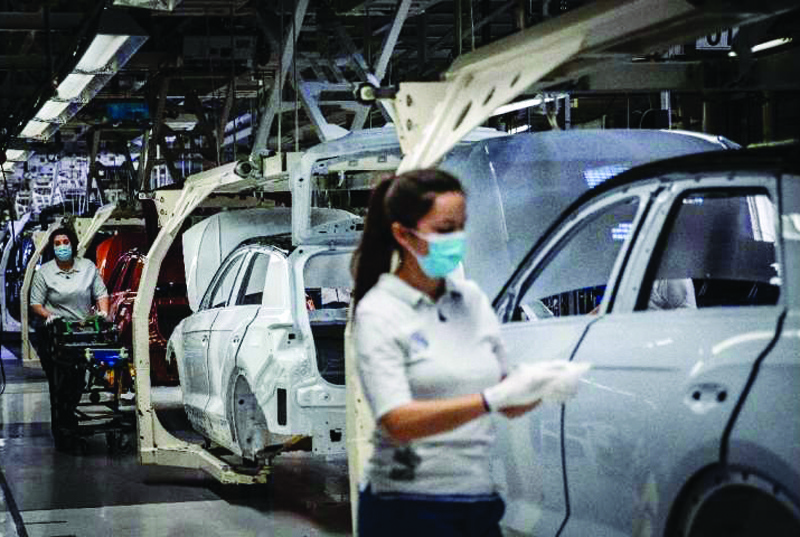 PARIS: A shortage of silicon chips is forcing automakers to cut back on production across the globe and may encourage efforts to cut reliance on Asian suppliers.
PARIS: A shortage of silicon chips is forcing automakers to cut back on production across the globe and may encourage efforts to cut reliance on Asian suppliers.
PARIS: A shortage of silicon chips is forcing automakers to cut back on production across the globe and may encourage efforts to cut reliance on Asian suppliers. Ford announced Thursday that it would drastically reduce output of its top-selling F-150 truck because of the shortage of semiconductors, while General Motors has announced it will suspend work at three North American factories.
In China, certain factories are shutting for two weeks. In Germany, Volkswagen halted production lines at two factories in January and in France Stellantis is cancelling Saturday shifts. Today's cars are chock full of processors. For example, an Audi SUV contains 38 of them, from the engine to the ABS braking system, and from the air bags to the parking assistance.
With automakers having in recent decades extended their supply chains and having become increasingly reliant on just-in-time delivery of parts, the shortage is quickly having a major impact on the sector. Market research firm IHS Markit recently estimated the shortage could delay the production of 672,000 vehicles in the first quarter of the year, mostly in China and Europe.
Shortage to last months
Today's shortages are the boomerang effect of auto factory shutdowns in early 2020 as Covid-19 first swept the world. "The sharp slowdown in the global auto industry in the first quarter of 2020 resulted in putting suppliers on temporary standby and delaying planned investments to respond to demand," said Claude Cham, who represents French auto parts suppliers.
But with chips in strong demand across various industries-especially as sales of computers exploded during lockdowns-chipmakers turned their attention to other clients. The auto sector then recovered more swiftly than expected in Asia, particularly in China. Bosch, the world's top auto parts manufacturer which produces some chips itself, said it is difficult to respond to swings in demand as setting up production can take up to six months for complicated models.
Meanwhile, 70 percent of production of the most advanced chips is assured by Taiwan Semiconductor Manufacturing Company (TSMC), according to IHS Markit. TSMC said its chip fabrication plants are running at full capacity and was doing its best to meet demand from automakers. "We don't see any improvement in the first quarter," warned Helmut Gassel, marketing director at German chipmaker Infineon. "For the second quarter, it depends to what extent the supply chain can shift. But this could last until the end of the year," he warned.
IHS doesn't see a quick recovery either. "The shortage is expected to last until the third quarter of 2021, when re-allocation of capacity from semiconductor foundries and possibly some cooling-off of consumer electronics demand should provide greater supply security," Automakers say they are doing their best to handle the situation, but it still harms them when they are struggling to recover from the COVID-fuelled plunge in sales last year. Ford said last week that it expects the delays could cost it $1-$2.5 billion in 2021. Most hope to be able to catch up on lost production in the second half of the year.
Europe recognizes risks
The chip shortage is being considered a wake-up call by European governments already worried about supply risks as China and the United States clashed over access to semiconductors for Huawei, according to Mathieu Duchatel at the Paris-based think tank Institut Montaigne. Thirteen European countries, including France and Germany, have since teamed up in the area, now considered essential to ensure Europe's strategic independence from Asia and the United States.
Europe currently accounts for only 10 percent of global semiconductor production. Joe Kaser, when he was still head of Siemens last month, told the German daily Handelsblatt that semiconductors were much more important than software or the cloud. "Microelectronics is the key to the development of tomorrow's industry," he said. - AFP




